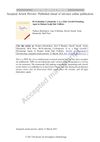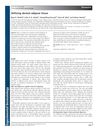Human hair follicle organ culture: theory, application and perspectives
November 2015
in “Experimental Dermatology”

TLDR Human hair follicle organ culture is a useful model for hair research with potential for studying hair biology and testing treatments.
The 2015 document reviews the use of human hair follicle organ culture (HFOC) as a tool for hair research, detailing its methodology, applications, and limitations. HFOC allows for the study of human hair follicles ex vivo, preserving many in vivo characteristics, and has been used for functional and mechanistic studies, including gene knock-down and expression profiling. The document outlines the importance of maintaining viable hair follicles in the anagen VI phase, the need for stringent quality control, and the use of markers like Ki-67 for assessing keratinocyte proliferation and TUNEL staining for apoptosis. It also discusses the potential of HFOC in studying hair biology, pigmentation, and the effects of pharmacological agents, particularly in conditions like androgenetic alopecia. Despite challenges such as the absence of systemic influences and variability between individual follicles, HFOC is highlighted as a valuable model for preclinical hair research. The document emphasizes the need for standardized methods to improve study comparability and concludes that HFOC has a promising future in various aspects of human skin biology research.
View this study on onlinelibrary.wiley.com →
Cited in this study

research Re-Evaluating Cyclosporine A as a Hair Growth–Promoting Agent in Human Scalp Hair Follicles
Cyclosporine A promotes hair growth and prolongs the active growth phase in human hair follicles, but may work differently than in rodents.

research The Circadian Clock in Skin
The skin's internal clock affects healing, cancer risk, aging, immunity, and hair growth, and disruptions can harm skin health.

research Resting no more: re‐defining telogen, the maintenance stage of the hair growth cycle
The telogen phase of hair growth is active and important for preparing hair follicles for regeneration, not just a resting stage.

research Differential effects of caffeine on hair shaft elongation, matrix and outer root sheath keratinocyte proliferation, and transforming growth factor‐β2/insulin‐like growth factor‐1‐mediated regulation of the hair cycle in male and female human hair folliclesin vitro
Caffeine affects hair growth and health differently in men and women.

research Neuroendocrinology of the hair follicle: principles and clinical perspectives
Hair follicles are hormone-sensitive and involved in growth and other functions, with potential for new treatments, but more research is needed.

research Defining dermal adipose tissue
Skin fat cells help with skin balance, hair growth, and healing wounds.
research Advanced Inhibition of Undesired Human Hair Growth by PPARγ Modulation?

research Does prostaglandin D2 hold the cure to male pattern baldness?
Prostaglandin D₂ might be targeted for new male pattern baldness treatments.

research Human epithelial hair follicle stem cells and their progeny: Current state of knowledge, the widening gap in translational research and future challenges
We need more research to better understand human hair follicle stem cells for improved treatments for hair loss and skin cancer.

research A practical guide for the study of human and murine sebaceous glands in situ
The guide explains how to study human and mouse sebaceous glands using various staining and imaging techniques, and emphasizes the need for standardized assessment methods.
research Topobiology of Human Pigmentation: P-Cadherin Selectively Stimulates Hair Follicle Melanogenesis

research Pathobiology of chemotherapy-induced hair loss
Chemotherapy causes hair loss by damaging hair follicles and stem cells, with more research needed for prevention and treatment.

research Dopamine is a novel, direct inducer of catagen in human scalp hair folliclesin vitro
Dopamine stops hair growth and pigment production in human scalp hair follicles.

research Mimicking Hair Disorders by Genetic Manipulation of Organ-Cultured Human Hair Follicles
Scientists can mimic hair disorders by altering genes in lab-grown human hair follicles, but these follicles lack some features of natural ones.

research Thymic Peptides Differentially Modulate Human Hair Follicle Growth
Some thymic peptides can increase human hair growth, while others may inhibit it.

research Spermidine Promotes Human Hair Growth and Is a Novel Modulator of Human Epithelial Stem Cell Functions
Spermidine may help reduce hair loss and deserves further testing as a treatment.

research Melanocyte stem cells: a melanocyte reservoir in hair follicles for hair and skin pigmentation
Melanocyte stem cells in hair follicles are key for hair color and could help treat greying and pigment disorders.
research The cell biology of human hair follicle pigmentation

research Intermediate hair follicles: a new more clinically relevant model for hair growth investigations
Intermediate hair follicles are a better model for studying hair growth and testing hair loss treatments.

research Mind the (Gender) Gap: Does Prolactin Exert Gender and/or Site-Specific Effects on the Human Hair Follicle?
Prolactin may affect hair growth differently based on gender and scalp area.

research The mineralocorticoid receptor as a novel player in skin biology: beyond the renal horizon?
The mineralocorticoid receptor may play a role in skin and hair health and could be a new target for treating related disorders.

research Prolactin—a novel neuroendocrine regulator of human keratin expressionin situ
Prolactin affects the production of different keratins in human hair, which could lead to new treatments for skin and hair disorders.

research The Hair Follicle as a Dynamic Miniorgan
Hair follicles are complex, dynamic mini-organs that help us understand cell growth, death, migration, and differentiation, as well as tissue regeneration and tumor biology.

research Thyroid Hormones Directly Alter Human Hair Follicle Functions: Anagen Prolongation and Stimulation of Both Hair Matrix Keratinocyte Proliferation and Hair Pigmentation
Thyroid hormones help hair grow, reduce hair loss, and increase hair pigment.

research Androgens and hair growth
Androgens can both increase and decrease hair growth in different parts of the body.

research Human hair follicles contain two forms of ATP‐ sensitive potassium channels, only one of which is sensitive to minoxidil
One minoxidil-sensitive potassium channel exists in human hair follicles.

research Probing the Effects of Stress Mediators on the Human Hair Follicle
Stress-related substance P may lead to hair loss and negatively affect hair growth.

research L ‐Carnitine–L ‐tartrate promotes human hair growth in vitro
L-Carnitine-L-tartrate may help hair grow and prevent hair loss.
research Dissecting the Impact of Chemotherapy on the Human Hair Follicle

research Hair follicle stem cells: Walking the maze
Hair follicle stem cells are key for hair and skin regeneration, can be reprogrammed, and have potential therapeutic uses, but also carry a risk of cancer.

research Human Scalp Hair Follicles Are Both a Target and a Source of Prolactin, which Serves as an Autocrine and/or Paracrine Promoter of Apoptosis-Driven Hair Follicle Regression
Prolactin contributes to hair loss by promoting hair follicle shrinkage and cell death.

research A Guide to Assessing Damage Response Pathways of the Hair Follicle: Lessons From Cyclophosphamide-Induced Alopecia in Mice
The document concludes that assessing hair follicle damage due to cyclophosphamide in mice involves analyzing structural changes and suggests a scoring system for standardized evaluation.

research Towards Dissecting the Pathogenesis of Retinoid-Induced Hair Loss: All-Trans Retinoic Acid Induces Premature Hair Follicle Regression (Catagen) by Upregulation of Transforming Growth Factor-β2 in the Dermal Papilla
All-trans retinoic acid causes hair loss by increasing TGF-β2 in hair follicle cells.

research Control of Human Hair Growth by Neurotrophins: Brain-Derived Neurotrophic Factor Inhibits Hair Shaft Elongation, Induces Catagen, and Stimulates Follicular Transforming Growth Factor β2 Expression
Brain-Derived Neurotrophic Factor (BDNF) slows down hair growth and promotes hair follicle regression.

research A Hot New Twist to Hair Biology
Capsaicin, found in chili peppers, can slow down hair growth by affecting skin cells and hair follicles.

research Novel and Established Potassium Channel Openers Stimulate Hair Growth In Vitro: Implications for their Modes of Action in Hair Follicles
Potassium channel openers like minoxidil help hair grow by acting on hair follicles.
research Hair Follicle Pigmentation

research Limitations of human occipital scalp hair follicle organ culture for studying the effects of minoxidil as a hair growth enhancer
Scalp hair follicle culture has limits for testing minoxidil's hair growth effects.

research Estrogens and Human Scalp Hair Growth—Still More Questions than Answers
The effects of estrogen on human hair growth are unclear and need more research.

research The Biology of Hair Follicles
Hair follicle biology advancements may lead to better hair growth disorder treatments.
research Whole Hair Follicle Culture
Related
research Skin‐on‐a‐chip strategies for human hair follicle regeneration
research 918 Tissue engineered human hair follicles from genetically, environmentally and extrinsically reprogrammed dermal papilla cells

research Temporary hair removal by low fluence photoepilation: Histological study on biopsies and cultured human hair follicles
Low fluence photoepilation temporarily removes hair by targeting the hair follicle's pigmented area without severe damage.

research Trans‐species hair growth induction by human hair follicle dermal papillae
Human hair follicle cells can grow hair when put into mouse skin if they stay in contact with mouse cells.

research Towards a molecular understanding of hair loss and its treatment
Future hair loss treatments should aim to extend hair growth, reactivate resting follicles, reverse shrinkage, and possibly create new follicles, with gene therapy showing promise.